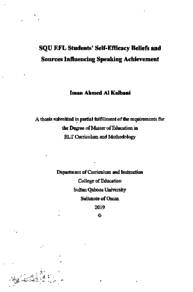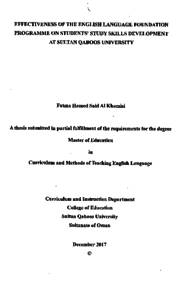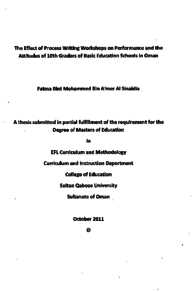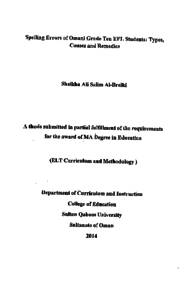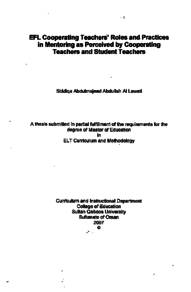Document
SQU EFL students' self-efficacy beliefs and sources speaking achievement
Publisher
Sultan Qaboos University
Gregorian
2019
Language
English
Subject
English abstract
The primary purpose of this study is to investigate the level of self-efficacy beliefs in speaking skills amongst Level Six English as a Foreign Language (EFL) students at the Center for Preparatory Studies (CPS) at Sultan Qaboos University (SQU). It also explores the differences in beliefs in the light of gender. Amongst Bandura's (1997) four sources of self-efficacy beliefs (i.e. mastery experience, vicarious experience, social persuasion, and psychological and emotional arousal), the study explores the most predictable sources of students' speaking self-efficacy beliefs. Finally, it aims to investigate the relationship between these beliefs and students' speaking skills performance. To this end, the study; therefore, addresses the following research questions: 1. What is the level of speaking self-efficacy beliefs of CPS EFL Level Six students at SQU? 2. Are there any significant differences in the speaking self-efficacy beliefs between male and female CPS EFL Level Şix students? 3. Considering Bandura's four sources of efficacy beliefs, which of the sources is the strongest predictor for students' speaking self-efficacy? 4. Is there any significant correlation between students' speaking self-efficacy beliefs and their speaking achievement? Two instruments were used to answer the research questions: the first instrument is a two-part scale. The first part of the scale is the speaking self-efficacy scale, which was developed by the researcher based on a literature review and previous self-efficacy scales. The second part is the speaking skill self-efficacy source scale, which was adopted from Pajares and Usher (2009), and Choy and Loo (2013). The second instrument was the total collected scores of students' speaking achievement, which were obtained from the CPS teachers. The collected data were treated using appropriate statistical techniques consisting mainly of t-test, correlation coefficient, and multiple linear regression. The reliability coefficients of the first and second scales were .94 and .91, respectively, The sample of this study was EFL humanities students at SQU, who were enrolled at Level Six of the language programme at the CPS (2018-2019). It consisted of 121 male and female students, The findings of the study can be summarized as follows: 1. EFL humanities Level Six students hold moderate levels of speaking self-efficacy beliefs. 2. No statistically significant difference was found between male and female students in terms of their speaking efficacy beliefs. 3. The experience of mastery was found to be the strongest predictor of students' speaking efficacy beliefs. 4. No statistically significant correlation was found between students levels of speaking efficacy beliefs and their speaking achievements. In the light of these research findings, certain implications and recommendations for further research are outlined.
Description
Thesis
Member of
Resource URL
Arabic abstract
إن الهدف الرئيسي من هذا البحث هو دراسة مستوى معتقدات الكفاءة الذاتية للتحدث باللغة الإنجليزية كلغة أجنبية بالنسبة للطلاب العمانيين الدارسين بمركز الدراسات التحضيرية بالمستوى السادس بجامعة السلطان قابوس. كما تهدف الدراسة أيضا إلى استكشاف الاختلافات في معتقدات الكفاءة الذاتية في ضوء نوع الجنس. ومن بين المصادر الأربعة (الخبرات الأدائية والخبرات البديلة والإقناع اللفظي والحالة الفسيولوجية والانفعالية المفترضة الكفاءة الذاتية لباندورا (۱۹۹۷) تستهدف الدراسة تقصي المصادر الأكثر تنبئة الكفاءة الذاتية للطلاب في التحدث. واخيرأ، فإن الدراسة تهدف إلى التحقق من العلاقة بين هذه المعتقدات والتحصيل الطلابي في التحدث. وتهدف الدراسة الحالية إلى الإجابة عن الأسئلة الآتية: 1. ما مستوى الكفاءة الذاتية للتحدث لدى طلاب الدراسات التحضيرية الدارسين للغة الانجليزية كلغة اجنبية بالمستوى السادس؟ .. هل توجد فروق ذات دلالة إحصائية بين الذكور والإناث في مستوى معتقدات الكفاءة الذاتية في التحدث ؟ ٣. بالنظر في المصادر الأربعة الكفاءة الذاتية لياندورا، أي من المصادر الأكثر تنبئأ بالكفاءة الذاتية للطلاب في التحدث؟ هل يوجد ارتباط ذو دلالة إحصائية بين مستوى معتقدات الكفاءة الذاتية للتحدث والتحصيل الأكاديمي في التحدث؟ ا ولجمع البيانات استخدمت أداتين وهما كالاتي: الأداة الأولى عبارة عن مقياس مكون من جزئيين. الجزء الأول عبارة عن مقياس الكفاءة الذاتية التحدث والذي طورته الباحثة في ضوء الإطلاع على الأدب النظري ومقاييس الكفاءة الذاتية السابقة. والجزء الثاني عبارة عن مقياس مصادر الكفاءة الذاتية في التحدث حيث تم تطويره وبنائه استنادا إلى مقياسي أعداء الباحثين أوشر وباجاريس (۲۰۰۹) وتشوي ولو (۲۰۱۳). أما الأداة الثانية تناولت جمع درجات المستوى التحصيلي للطلاب في التحدث من معلمي مركز الدراسات التحضيرية واستخدمت الباحثة طرق إحصائية مناسبة اشتملت أساسية على اختبارات تي للعينات المستقلة والانحدار المعياري المتعدد ومعامل الترابط . وتراوح عامل الثبات المقياسيين الأول والثاني بين ۹۲.. و94.. على التوالي وكانت عينة الدراسة هم من طلاب الكليات الإنسانية بجامعة السلطان قابون والدارسين المستوى السادس للغة الانجليزية بمركز الدراسات التحضيرية للعام الأكاديمي (۲۰۱۷-۲۰۱۸م) حيث اشتملت العينة على ۱۲۱ طالب وطالبة ويمكن تلخيص النتائج الرئيسية التي توصلت إليها الرسالة في النقاط التالية: (۱) حصل طلاب الدراسات التحضيرية الدارسين للغة الانجليزية كلغة أجنبية بالمستوى السادس على مستوى متوسط الكفاءة الذاتية في التحدث (۲) لا توجد فروق ذات دلالة إحصائية بين الذكور والإناث في مستوى معتقدات الكفاءة الذاتية في التحدث (۳) الخبرات السابقة اعتبرت المصدر الأكثر تنبأ الكفاءة الذاتية في التحدث لدى الطلاب (4) لا يوجد ارتباط ذو دلالة إحصائية بين مستوى معتقدات الطلاب الكفاءة الذاتية في التحدث والتحصيل الأكاديمي في التحدث لديهم. وفي ضوء هذه النتائج، عرضت الباحثة عددا من التوصيات والمقترحات المتعلقة بالموضوع
Category
Theses and Dissertations

